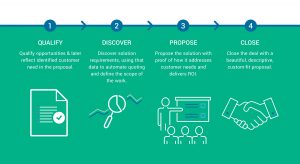It’s that time of year when sales managers and account managers are meeting to review 2017 performances and lay out goals for 2018. There are a KPIs you’ll review, targets you’ll discuss for next year, and areas you’ll address for improvement. The truth is, it all boils down to one goal: sell more high margin product/services in less time. The key to this is focusing on your sales process and proposals.
Sales Process for the Win
The secret to winning more in less time lies in developing and refining your sales proposal process. First, consider that process is the key to growth. While your sales team can perform a number of tasks, it is the process itself that allows you to reach your target market with greater efficiency. Second, the automation of that process allows you to work those leads with greater efficiency and profitability over a shorter period of time. The ability to sell more in less time boils down to developed processes that can be automated and optimized for performance and output.
To demonstrate, let’s walk through the four phases of presales and look at how automation can enable your team to close more sales in less time during each stage of a sale.
1. Qualification
Every technology integration space has a qualification process. Many businesses use qualification processes that are informal; most are lacking the buy-in they need from key stakeholders, and few leverage rules and workflows that prevent an account manager from taking the next step in the sales process.
The lack of a formal, documented, and vetted qualification process is a huge hindrance to sales success. A developed qualification (that can be automated) includes the ability to:
- Ensure that your company is right for your prospects. This means you must be sure that the prospect is going to need the services you provide and that they will be able to pay your asking price.
- Provide the sales team with criteria for identifying potential leads and decision makers.
- Identify questions that will help you quickly narrow in on the pain points that interfere most with your customers and enable you to address them thoroughly in your proposal.
- Prevent your sales team from spending time on the opportunities that might be right in terms of pain points or business attributes, but are not ready in terms of budget, authority, need, and time.
Ultimately, an optimal qualification process helps you to focus on the best opportunities that have the highest chance of closing and enables you to hone in on the exact pain points that are driving your customer to make a change, so you can address those pain points thoroughly in the discovery and sales proposal.
It’s basically impossible to make the qualification process consistent and seamless without the features offered by CorsPro SalesDoc Architect (SDA), facilitating qualification questions, processes, and rules so you know exactly which questions to ask every single time, and which pain points to focus on in your sales proposal. Most importantly, the automation and logic of SDA will help you avoid scope creep after the sale by adequately addressing the pain points identified in the qualification stage later in your sales proposal.
2. Discover
Many of you reading this may be Sales Managers and Sales professionals, but for the sake of clarity, we are going to talk about the difference between the discovery and qualification stages before addressing the need for process and automation.
What’s the difference?
A lot of organizations tend to blur the lines between qualification and discovery. That’s natural because there is a bit of overlap between these two stages. Both include exploring customer needs to determine what solution will best address the project on the table. Where the qualification process should uncover the pain points your customer faces in a high-level manner, the discovery takes a very deep dive into the specifics of the solution design necessary to solve those pain points.
The discovery should address:
- Infrastructure and underlying technology necessary to implement a solution
- Accessibility for your team to complete the installation. For example: are there union rules to consider for different customer locations?
- Any assessment you need to conduct, or dependencies to plan for
- Site or physical surveys
Discovery is another process that is typically informal—your team knows there are parts of it that need to happen, but it’s not typically a measured, consistent, or systematic. This leaves a lot of room for error in terms of labor cost, accessibility, necessary upgrades to infrastructure, software, and the countless other details necessary for a successful installation. A lax discovery process also leaves questions in terms of customer responsibility, as well as items that are not included in the sales proposals. A poorly scoped project will bleed your profit margins dry, and extend project timelines that lead to unhappy customers (read: no referrals or repeat business).
CorsPro provides sophisticated automation that greatly reduces the likelihood of misunderstandings and error by accounting for dependencies and related technologies in the proposal, so you don’t overlook those details that can make or break a successful implementation. It also creates a system in which your interdependent changes are automatic, meaning if you change something in one area that affects another area of your solution, those changes carry over. This reduces the likelihood of forgetting something important, or the need to go back and forth with the prospective client after the initial proposal has been delivered. It also allows for those changes to occur quickly, so you are able to turn your sales proposals around quickly and beat the competition to the delivery date.
3. Propose
We all know what a proposal is and why it’s important to the sales process. The proposal is where all of the work you’ve put on the front end really pays out. It demonstrates you thoroughly understand the prospect’s pain points and that your solution addresses the complexity of the project, performing as promised. This persuasive element is what’s missing in many proposals. It can put your team miles ahead of your competition when it comes to providing key differentiators and concrete proof that you understand their issues better than the competition.
Many proposals fail because:
- They’re overkill and have too much information
- They don’t address the pain points adequately or quickly enough
- They just list parts and prices, putting you in the middle of a price war
- There’s no strong, clear call to action
How does automation fit in? What are the parts of sales proposals that lead to scope creep after the deal is signed?CorsPro SDA automates the proposal process and includes the necessary elements for a favorable outcome, in a format that is both professional and persuasive. SDA pulls from a library of content that allows your team to deliver polished and professional proposals in a consistent and timely manner. It’s an easy way to ensure that you’re able to produce that proposal on a timeline that works for your customers. The information is accurate, and it’s formatted in a way that helps your customer understand why you’re the right solution for their issues.
Additionally, a better proposal allows you to level up in the technology world. You might be able to target larger organizations, bigger projects, and better prospects with a higher level of proposal. Automation is the best way to consistently produce professional, effective proposals that quickly address your customer pain points and solve them.
4. Close
If you have put all of the elements in place in the first 3 presales phases, the close phase should be the result. Every single piece of the process is designed to get you to a better closure rate and enable your team to close more sales faster. But there are a lot of details that go into closing that have nothing to do with the proposal. Concepts about building relationships, networking, and having a very thorough understanding of your customer’s needs are integral to closing sales.
Those are all very difficult things to do when you’re spending your valuable time making multiple sales proposals and quoting revisions for approval. The opportunity for human error is simply too great when several individuals are involved. This uses valuable time building sales proposals rather than building the relationship.
Automation and processes allow businesses to sell more in less time; they enable your teams to sell the most profitable products/services to the targets that need your services. CorsPro SDA enables your team to handle the entire process from qualification to close in a manner that’s seamless, pain-free, and automated. SDA automates the parts of the process that can and should be automated while enabling you to focus your energies on the parts of the sale that should be individualized and customized.
